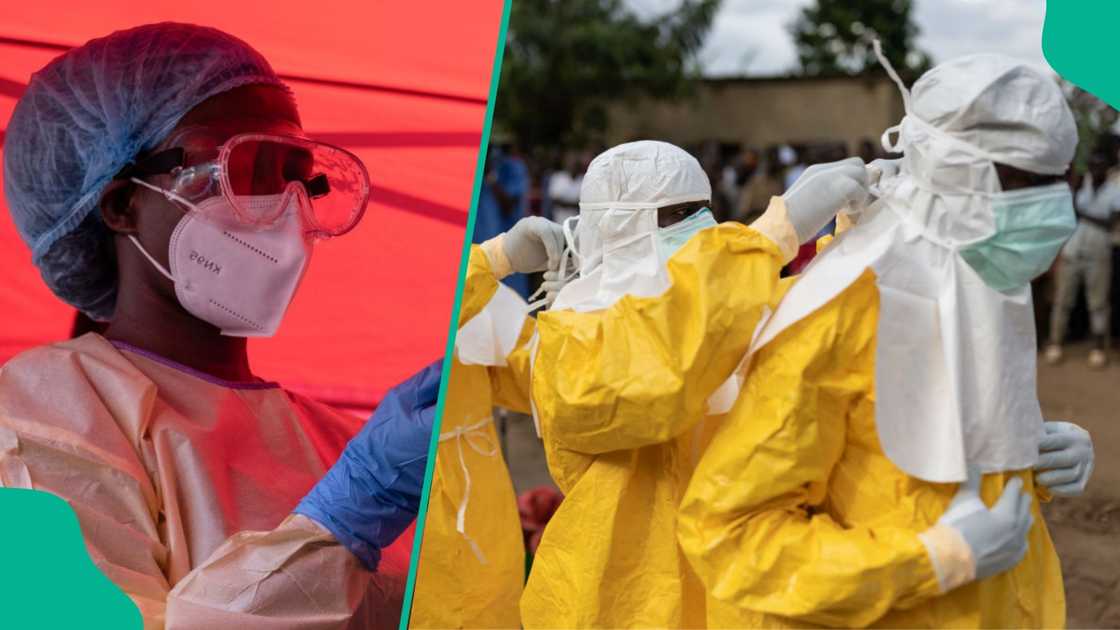Breaking: FG Gives Update on Suspected Ebola Case, Other Viral Haemorrhagic Fevers in Abuja
- The NCDC has confirmed that two recent suspected cases of viral haemorrhagic fever in Abuja tested negative for both Ebola and Marburg viruses
- NCDC boss, Dr. Jide Idris, disclosed this in a statement, explaining that the most recent case involved a traveller who arrived in Abuja from Kigali, Rwanda
- The NCDC commended doctors and staff of Nisa Premier Hospital, Abuja, for their 'swift action'
Legit.ng journalist Ridwan Adeola Yusuf has over 9 years of experience covering health matters and global affairs.
FCT, Abuja - The Nigeria Centre for Disease Control and Prevention (NCDC) on Friday, September 19, disclosed that two recent suspected cases tested negative for Ebola and Marburg.
According to a statement signed by Dr. Jide Idris, obtained by Legit.ng, further tests for other viral haemorrhagic fevers (VHFs) like Lassa and Dengue are ongoing.

Source: Twitter
Ebola: NCDC calms tension
The statement said:
"Thanks to early reporting by a traveller and the swift action of vigilant health workers, the risk to the public was minimised."
Legit.ng learnt that one of the suspected case of VHF was reported at Nisa Premier Hospital in Abuja.
The patient, a 32-year-old man identified by initials O.I., who was presented with fever, bleeding, and other concerning symptoms, was immediately isolated upon arrival at the hospital, according to the News Agency of Nigeria (NAN).
The hospital promptly alerted the NCDC, which carried out tests to determine if the case was linked to viral haemorrhagic fevers such as Ebola, Marburg, Dengue, or Lassa fever.
The result of the test carried out by the NCDC subsequently came out negative.
New Ebola outbreak in Africa
Per The Conversation, the Democratic Republic of the Congo (DRC) has declared a new Ebola outbreak in Kasai Province. It is caused by the most severe strain: Zaire Ebola virus.

Read also
Diddy transferred to federal prison in New Jersey to serve jail term: "U commit you suffer for it"
This outbreak began with a 34-year-old pregnant woman who was admitted to hospital on August 20 and died five days later. Two health workers in Congo who treated her also became infected and died.
By Monday, September 15, there were 81 confirmed cases and 28 deaths, including four health workers.

Source: Getty Images
Why Ebola is so dangerous
Ebola virus disease is a rare but severe, often fatal illness in humans. It is transmitted to people through close contact with the blood, secretions, organs or other bodily fluids of infected animals such as fruit bats (thought to be the natural hosts).
Human-to-human transmission is through direct contact with blood or body fluids of a person who is sick with or has died from Ebola, objects that have been contaminated with body fluids from a person sick with Ebola or the body of a person who died from Ebola.
Ebola: How Africa is responding
Response to the Ebola outbreak, especially in the Democratic Republic of the Congo, is accelerating, with a range of control measures being scaled up leading to quicker detection of the virus, early start of treatment and care, contact tracing, as well as vaccine rollout.
To reduce community transmission as well as safeguard the health workers who are at most risk, a total of 523 frontline health workers in Bulape health zone and contacts have been vaccinated as of Tuesday, September 16.
Treatment centres are being established to ensure effective and safe care of people infected with the virus.
Ebola: Expert harps on standard procedure
Meanwhile, a licensed healthcare provider, Dr Ewunuga Sheriffdeen, urged Nigerians to strictly adhere to the internationally laid down standard procedures in containing the spread of the Ebola virus.
The advice was given during an exclusive chat with Legit.ng.
Dr Sheriffdeen told Legit.ng:
"Adequate personal and environmental hygiene coupled with prompt medical attention for those infected with the Ebola virus remain some of the steps that could ensure the virus are contained and does not spread to Nigeria."
He added:
“Obviously the Ebola situation provides more reasons for all Nigerians to promote health and cleanliness, but we think it goes far beyond the Ebola situation. The situation has been well managed by central government across, but the challenge this throws at all stakeholders is one of ensuring that we act to ensure that we engender positive public health outcomes.”
Read more global news:
- Cameroon: "Don't vote for my father", President's daughter tells electorate, gives reason
- Macrons to present evidence in US court to prove French first lady Brigitte is not a man
NCDC announces rise in Lassa fever
Previously, Legit.ng reported Nigeria recorded 1,035 confirmed cases of Lassa fever out of 8,569 suspected cases, resulting in 174 deaths across 28 states and 129 local government areas as of October 13, 2024.
The NCDC reported 380 confirmed cases of Cerebrospinal Meningitis (CSM) out of 4,915 suspected cases, with 361 deaths in 24 states across 174 local government areas.
Source: Legit.ng




